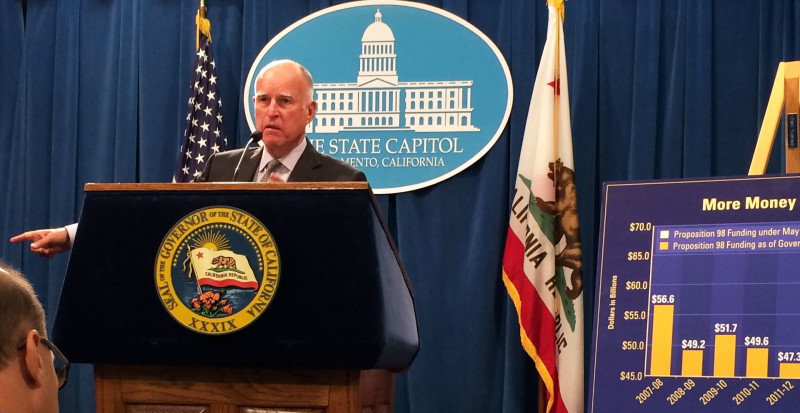Over the course of three fiscal years (last year, this year, next year), the Brown administration has now raised its general fund revenue estimates by $6.7 billion.
Spending has gone up, too, driven largely by the constitutional school funding guarantees under Proposition 98. But the revised spending plan also includes a recalibration of the Brown manifesto, changes made in the face of new demands that the governor hasn't done enough to help some of those in need.
Brown's Tax Break For the Working Poor
The best example of the course adjustment may be Thursday's rollout of a new state earned income tax credit (EITC) -- a staple of federal tax policy since 1975 and one embraced with additional tax credits in more than two dozen other states. Last year, the Legislature asked for a detailed review of EITC options from the nonpartisan Legislative Analyst's Office. In that report, the LAO concluded that 10 million Californians -- more than one in four -- lived in a household in 2012 that benefited from the federal EITC. Advocates have long praised the tax break at as an effective way to put more money back into the pockets of the working poor.
There have been three legislative proposals in the past four years to create a state tax credit, and Assembly Democrats placed it on their budget wish list just days ago.
On Thursday, the governor tried to not sound like a newcomer to the idea. "I've always liked the earned income tax credit," said Brown.
His proposal is smaller than other EITC ideas, and thus would cost less, about $380 million in the coming year and assumed to exist for at least the next four years. Brown defended his proposal's size in the Q&A with reporters, while still conceding there are some who think he hasn't done enough on the issue of income inequality.
"I've heard that," said the governor at his budget news conference. "And I thought this would be a reasonable response."
Brown Cuts a Deal With UC
Reasonable can be read by some as "moderate," and the tax credit isn't the only example of that in Brown's revised budget plan. It's also one way to describe the deal struck with the University of California and UC's politically savvy president, Janet Napolitano.
In a nutshell: Napolitano called off any in-state tuition increases for the next two school years in exchange for Brown adding $146 million to the state's UC spending in the fiscal year to come -- earmarked for maintenance, energy efficiency and help in filling in the university's long-term employee pension shortfall. (The pension money, which will come from Proposition 2 debt payment funds, totals $436 million over three fiscal years).
That kind of moderation seems to have resolved at least the short-term fight with UC's leadership. Napolitano, a veteran politician herself, saw it as a deal worth taking.
"Obviously, one always wants more money from the state," she said in an interview with KQED News. "But I think this is a very, very fair deal for us."
And Brown was careful to squelch any idea that he'd given away too much, especially on the help for UC's pension debt.
"This is not free money," he said Thursday.
So what's next? The 32 days between the revised budget's release and the constitutional deadline for the Legislature to place a spending plan on Brown's desk will be fascinating to watch. Perhaps the moderating strategy, even if it means new expenses, isn't over. For example, Brown's budget director suggested on Thursday that there's room to talk about another fiscal fight: The effort by doctors and other advocates to restore the recession-era cuts in fees paid to doctors who take Medi-Cal patients.
Even so, there's probably some kind of tipping point -- perhaps only known to Brown and his closest advisers -- for what's a reasonable expense, and what's a harbinger of a new era of money mistakes. And perhaps that tipping point is tied to the Capitol's growing sense that a gubernatorial legacy is now coming into sight.
"One thing we know is that when governors leave town with big deficits, they're more scorned than praised," said Brown toward the end of his budget presentation. "I think it's all balance."
